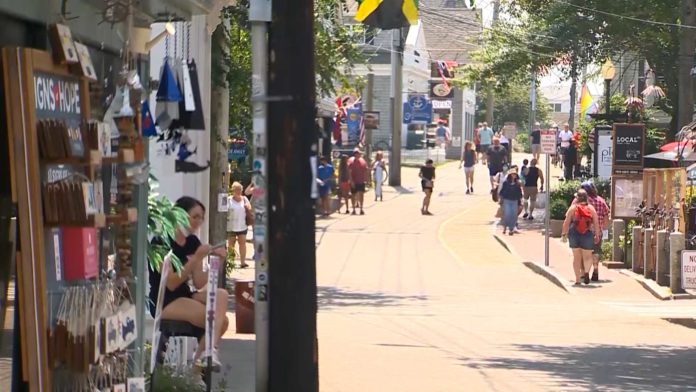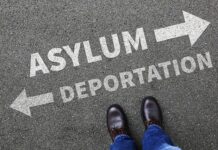
Officials in the Cape Cod community of Provincetown are working to educate the public about monkeypox prevention as the number of cases continues to grow in Massachusetts.Provincetown’s leaders have hosted several in-person and virtual informational sessions about monkeypox over the past two weeks, most recently on Tuesday with local health officials, Barnstable County health officials and representatives from the Massachusetts Department of Public Health.In addition, employees of restaurants, hotels and other businesses in Provincetown have been recruited to help educate visitors and locals about monkeypox and how to prevent the spread of the virus.On Thursday, the Massachusetts DPH confirmed eight new cases of monkeypox within the past week. The total number of cases in Massachusetts has now risen to 21 since the first U.S. case was confirmed in the state in mid-May.Centers for Disease Control and Prevention data shows there have been 351 cases of the monkeypox virus this year in U.S. residents.The DPH said while many of the early cases were associated with international travel, recent cases are not.”Gay and bisexual men and other men who have sex with men make up a large proportion of the cases identified to date,” the DPH said in a news release. “However, the risk is not limited to the LGBT community, and anyone who has been in close contact with someone who has monkeypox is at risk.”Because of the prevalence of monkeypox cases within the LGBTQ community, Provincetown public health officials are concerned about the local spread of monkeypox due to the town’s large year-round and seasonal LGBTQ population.Provincetown officials are also taking extra caution with monkeypox after hundreds of COVID-19 cases were tied to a cluster in the Cape Cod community last year around the Fourth of July.Early symptoms of monkeypox can include fever, headache, sore throat and swollen lymph nodes, but a rash may be the first symptom. Rash lesions start flat, become raised, fill with clear fluid (vesicles) and then become pustules (filled with pus). A person with monkeypox can have many lesions or they may only have a few.While the virus does not spread easily between people, people can spread the infection once they develop symptoms. Transmission occurs through direct contact with body fluids and monkeypox sores, by touching items that have been contaminated with fluids or sores (clothing, bedding, etc.), or less commonly, through respiratory droplets following prolonged face-to-face contact.There have been no deaths in the U.S. or globally related to this outbreak and patients generally recover fully in two to four weeks.Anyone who believes they may have monkeypox should isolate, but if they need to leave their home, they should wear a mask and cover their rash or lesions when around others.Those who live with or care for someone who may have monkeypox should wear a mask and disposable gloves if they need to have any direct contact with lesions and when handling any clothes or bedding if the person cannot do it themselves. They should also wash their hands regularly, especially after contact with the person who is infected or with their clothes, bed sheets, towels and other items or surfaces they have touched.
Officials in the Cape Cod community of Provincetown are working to educate the public about monkeypox prevention as the number of cases continues to grow in Massachusetts.
Provincetown’s leaders have hosted several in-person and virtual informational sessions about monkeypox over the past two weeks, most recently on Tuesday with local health officials, Barnstable County health officials and representatives from the Massachusetts Department of Public Health.
Advertisement
In addition, employees of restaurants, hotels and other businesses in Provincetown have been recruited to help educate visitors and locals about monkeypox and how to prevent the spread of the virus.
On Thursday, the Massachusetts DPH confirmed eight new cases of monkeypox within the past week. The total number of cases in Massachusetts has now risen to 21 since the first U.S. case was confirmed in the state in mid-May.
Centers for Disease Control and Prevention data shows there have been 351 cases of the monkeypox virus this year in U.S. residents.
The DPH said while many of the early cases were associated with international travel, recent cases are not.
“Gay and bisexual men and other men who have sex with men make up a large proportion of the cases identified to date,” the DPH said in a news release. “However, the risk is not limited to the LGBT community, and anyone who has been in close contact with someone who has monkeypox is at risk.”
Because of the prevalence of monkeypox cases within the LGBTQ community, Provincetown public health officials are concerned about the local spread of monkeypox due to the town’s large year-round and seasonal LGBTQ population.
Provincetown officials are also taking extra caution with monkeypox after hundreds of COVID-19 cases were tied to a cluster in the Cape Cod community last year around the Fourth of July.
Early symptoms of monkeypox can include fever, headache, sore throat and swollen lymph nodes, but a rash may be the first symptom. Rash lesions start flat, become raised, fill with clear fluid (vesicles) and then become pustules (filled with pus). A person with monkeypox can have many lesions or they may only have a few.
While the virus does not spread easily between people, people can spread the infection once they develop symptoms. Transmission occurs through direct contact with body fluids and monkeypox sores, by touching items that have been contaminated with fluids or sores (clothing, bedding, etc.), or less commonly, through respiratory droplets following prolonged face-to-face contact.
There have been no deaths in the U.S. or globally related to this outbreak and patients generally recover fully in two to four weeks.
Anyone who believes they may have monkeypox should isolate, but if they need to leave their home, they should wear a mask and cover their rash or lesions when around others.
Those who live with or care for someone who may have monkeypox should wear a mask and disposable gloves if they need to have any direct contact with lesions and when handling any clothes or bedding if the person cannot do it themselves. They should also wash their hands regularly, especially after contact with the person who is infected or with their clothes, bed sheets, towels and other items or surfaces they have touched.






